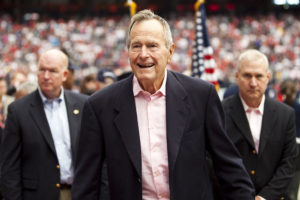The Darker Side of George H. W. Bush’s Kinder, Gentler Faith-Based Politics
 Former President George HW Bush in 2010 (Photo by AJ Guel)
Former President George HW Bush in 2010 (Photo by AJ Guel) During my graduation from Yale Divinity School in 1992, I decried those protesting President George H. W. Bush as he delivered Yale’s main commencement address. How dare they destroy my pomp and circumstance with such rabble-rousing?
Bush represented the (in his own infamous words) kinder, gentler, religiously infused Republicanism one finds among the upper crust of Greenwich, Connecticut. Here Bush spent his formative years, when his father, Prescott Bush, served as a senator. In New Haven I had embarked on a spiritual quest that had me clutching my white pearls in search of a proper faith I could follow.
But I had not yet grasped the reality that the Bush family’s version of white-gloved Episcopalianism masked an iron fist enforcing a dark right-wing agenda. Two years after graduation, I began writing for the Wittenburg Door, the nation’s oldest religious satire magazine. Under the tutelage of the editor, Robert Darden, I honed my critical thinking skills and learned to satirize American Christianity with a particular focus on the intersection of faith and politics. On the way, I learned much about the gap between Bush’s religion and his politics.
True, depicting Bush as a kinder, gentler fighter pilot may be accurate. And considering the current Cheeto-in-Chief, a certain nostalgia for the forty-first president’s demeanor is understandable. But before we get too into the grand eulogizing of an elder statesman, let us remember the irony of his death one day before World AIDS Day, and the number of people who died from AIDS due to his indifference. Some pioneers in his US Episcopal Church were on the forefront of caring for people with AIDS. Episcopalians were among the first denominations to conduct funerals for people who died of AIDS.
I would later follow those working on the fringes of their faith, beginning a journey that led me, as so many, out of the institutional church. By then Bush’s form of the faith and mine represented the opposite ends of the Anglican spectrum.
As I reflect on George H. W. Bush, I wonder how he reconciled his faith with his association with the CIA (including at the helm for a year). A cursory look at his life, as reported by outlets like Rolling Stone, New York magazine, and The Intercept, reveals he had a major hand in propping up some god-awful dictatorships. Along those lines, investigative journalist Greg Palast’s documentary Bush Family Fortunes shows how the family’s oil connections to the bin Ladens and the Saudi royal family caused H. W. (as presidents since) to turn a blind eye to Saudi atrocities. When he did intervene to curtail a dictator he had once supported, he did so in a way that cost hundreds of thousands of Iraqi lives.
At home, the Willie Horton ad, for which Bush never apologized, lent considerable fuel to racist rhetoric among the religious right. Thanks to him we also have Clarence Thomas on the US Supreme Court, and then there’s his role in advancing his sons’ political agendas. While Bush Sr. may not have been as explicitly religious as his namesake son, his actions still contravene the faith he claimed to possess.
Consider his embrace of “The Family,” host of the National Prayer Breakfast, a haven for the international elite to gather with US lawmakers to advance political agendas under the guise of communal prayer. In Jeff Sharlet’s book, The Family, he recounts Bush Sr.’s appraisal of the late Doug Coe, who was the leader of The Family during the 1990 National Prayer Breakfast. “[He] praised Doug Coe for what he described as ‘quiet diplomacy, I wouldn’t say secret diplomacy.’” Sharlet adds, “Bush was apparently ignorant of one of the nation’s oldest laws, the Logan Act, which forbids private citizens [from negotiating with foreign governments that are in dispute with the US] lest foreign policy slip out of democratic control.”
To paraphrase Dylan Thomas, let us not allow Bush to go gently into that good night. If we don’t outwardly rage, may we at least note that Bush’s refusal to go beyond lip service to a kinder, gentler faith led to the dimming of the light of many lives.
